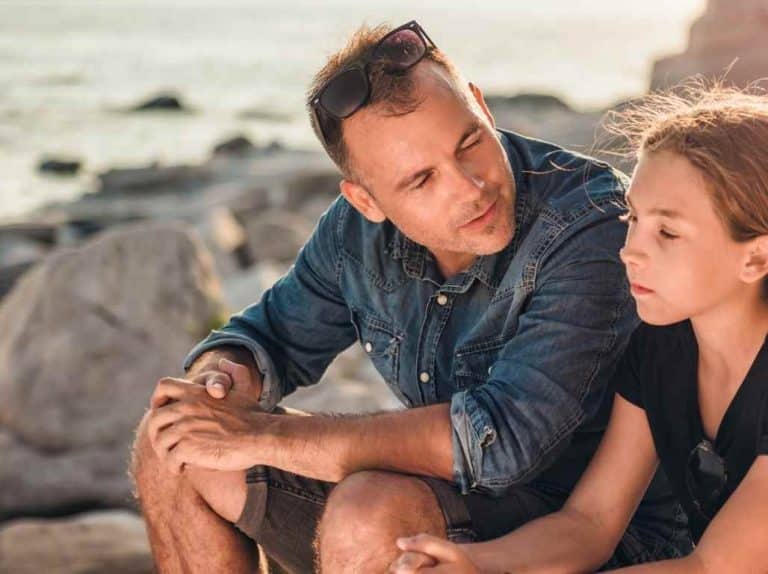Here Are Some Helpful Tips To Explain Addiction To Children
When is a good time to explain addiction to children? With holidays all year around you may be anticipating a few family parties that you and your children need to attend. When you have an addiction in the family, whether it is a parent or uncle, it can make holiday parties difficult, especially when you need to explain the situation to your children before arriving. The holidays are usually a time when people enjoy alcohol, but for some who are in active addiction or recovering family reunions can be hard. Your kids may ask why grandpa doesn’t drink like every other adult, or why their father can’t attend the family party this year, or why someone is acting crazy (is drunk) at the party.
Explain Addiction To Children: Inform Yourself First
Before trying to explain addiction to a child, get informed yourself so you know that what you’re telling them is just right for their age and their comfort level. Kids often have a lot of questions especially when the topic is not something that they are familiar with, so you want to be sure to have as many answers as you can. Check the ROR articles below to learn more about addiction and explore online resources that can help you become more familiar with the topic. Did you know that 1 in 4 families has a problem with addiction, either parents, grandparents, children, or adult children? Knowing how to explain a family problem is essential for creating a feeling of safety and a safe environment for children.
Explain Addiction To Children: Ask For Advice
You might be surprised by how many people have had similar experiences as you are having. If you attend Al-Anon, or any other addiction support group for families, there is probably someone there who has gone through the same thing you are. Don’t be afraid to ask them how they went about it.
Even if they don’t have a perfect answer for you, you can still learn a lot about how not to approach it by listening to someone else’s mistakes. The person or people that you speak to may also have advice for things they did that they wish they had not.
Speaking to someone will also make you feel less alone, and it can be a comfort to know that you are not the only person who has ever experienced this. If you do not already attend support group meetings, look for some in your area. There are also alcoholics anonymous and narcotics anonymous meetings that are available for family members of addicts. If you cannot find one near you or don’t feel comfortable going in person for any reason, try an online chat room or support group.
Explain Addiction To Children At Their Level
There are a lot of resources available that are designed to help teach children about addiction. If you have young children, Sesame Street may actually be able to help. In 2019, Sesame Street started a series about a child whose parents are struggling with addiction. This could be a great place to start, especially if you are not sure how to explain it to your kids on your own. After you have watched the story together, you can sit down and answer any questions that they have.
If you have children who won’t take well to Sesame Street because they are older or just not interested, there are a lot of books available that can help you. Many addiction treatment centers or support groups have lists of books available that they think can help explain addiction to children. You can read the book together and then discuss it after, and it is also a great resource for kids to go back to if they are confused or struggling to understand the situation.
Explain Addiction To Children: Start Early
While you may want to keep your children sheltered from reality as long as possible, using age-appropriate terms and resources to help your child understand their situation is going to benefit them in the long run. You want to be able to have control over the understanding your kids have about addiction before they get the wrong information from kids at school or on the internet. Keeping secrets about addiction to protect a loved one can be damaging for children who know that something is wrong. Here’s a coloring book to empower them.
https://reachoutrecovery.com/product/the-8-cs-that-help-me-be-all-right-coloring-book/
Keep It Age Appropriate
Although it can be difficult to discuss deep topics with children in a way they understand, you want to make sure you are using language and concepts that your children understand. If you have a four-year-old, you are not going to explain it to them the same way that you would a 10-year-old.
Be Honest
Although it can be hard, you don’t want to sugarcoat the situation. Finding a balance between honesty and sharing detrimental information can be hard, but the truth is that it is better to be upfront and give your children a realistic idea of the situation than to allow them to be misinformed.
Overall, when explaining addiction to children you want to help them understand on a level that is appropriate for them and to validate their feelings about the situation. It is important for children to develop coping skills in situations where addiction in the family affects them.
 Jenn Walker is a freelance writer, blogger, dog-enthusiast, and avid beach goer operating out of Southern New Jersey.
Jenn Walker is a freelance writer, blogger, dog-enthusiast, and avid beach goer operating out of Southern New Jersey.
Whether your loved one is in addiction recovery, or the family needs tools to heal consider a coloring book project that everyone can enjoy and learn from.
https://reachoutrecovery.com/product/find-your-true-colors-in-12-steps-expanded-edition/
More Articles to Read About Addiction
How To Help Loved Ones With Alcohol Addiction
Myths About Addiction And What Makes Recovery Work
How Alcohol Free Parenting Can Save Your Kids
How Long Does Addiction Recovery Take
Is Addiction Curable: Know What Recovery Really Means
Growing Up In Recovery After You Get Sober





















